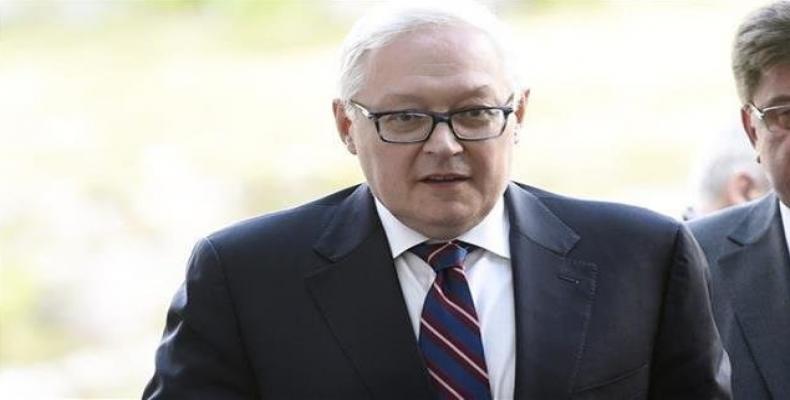Moscow, January 22 (RHC)-- Russia has rejected a U.S. demand for Moscow to destroy a new cruise missile system, a weapon Washington alleges is in violation of the landmark Intermediate-range Nuclear Forces (INF) Treaty.
Russian Deputy Foreign Minister Sergei Ryabkov said it was unacceptable for Washington to demand Moscow destroy its SSC-8/9M729 cruise missile, denying the missile system is in breach of INF.
INF was a Cold-War era treaty signed in 1987 that eliminated all nuclear and conventional missiles with ranges of 1,000–5,500 km (620–3,420 mi).
Ryabkov also said Russia has proposed putting on a demonstration of the missile for the United States. "We are ready to show unprecedented transparency on the 9M729 missile, which alarms the Americans so much. We offered them a presentation and a briefing on the missile, which absolutely does not follow from the content of the treaty itself,” he said. “But at the same time, we insist that the Americans take practical steps to alleviate our concerns on the Aegis Ashore systems, deployed in Romania, whose deployment is also scheduled in Poland soon."
The statement comes after U.S. disarmament ambassador Robert Wood called on Russia to "verifiably destroy” the missiles in order to save the INF treaty and accused Moscow of destabilizing global security. Wood claimed the system was capable of carrying both conventional and nuclear warheads and represented a "potent and direct threat to Europe and Asia" as it had a range of 500 to 1,500 kilometers (310-620 miles).
U.S. President Donald Trump's administration last week rejected an offer by Moscow to save the INF treaty, claiming it could not be properly verified, setting the stage for Washington to withdraw from the pact next month.
Moscow has refuted the U.S. allegations, pointing out that Washington has provided no proof that Russia has, in fact, violated the treaty by deploying the missiles.
Russian Foreign Minister Sergei Lavrov said that Washington's stance on the INF jeopardizes further nuclear disarmament and the sustainability of the non-proliferation treaty.
Ties between Moscow and Washington have plummeted to levels not seen since the Cold War due to the two countries’ disputes over the crises in Ukraine and Syria and after US officials accused Russia of meddling in the 2016 US presidential election.
Western countries have levied broad economic sanctions against Moscow over its support for pro-Russia forces in eastern Ukraine and Crimea’s reunification with Russia.
U.S. intelligence agencies allege that Russia had influenced the U.S. presidential election in November that year to help Trump get elected, an allegation that Russia has strongly denied.
Russia rejects U.S. demand to destroy new missile system

Articles en relation
Commentaires
Laissez un commentaire
Tous les champs sont requisPlus de visites
- Lula rejette le blocus de Cuba au sommet de la Celac et met en garde contre l'ingérence
- La levée du blocus américain contre Cuba est demandée en France
- L'ambassadeur de Cuba au Venezuela remercie la solidarité internationale avec les missions médicales (+Photo)
- Le gouvernement guatémaltèque est appelé à rejeter les positions extrêmes interventionnistes des États-Unis à l'égard de Cuba
- Le président Díaz-Canel rentre à Cuba après avoir participé au sommet de la CELAC au Honduras (+Photo)

